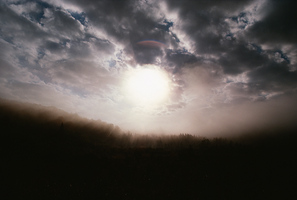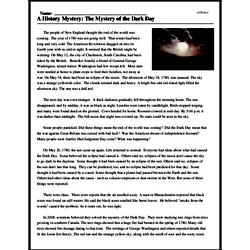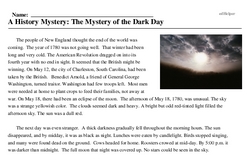A History Mystery: The Mystery of the Dark Day
The people of New England thought the end of the world was coming. The year of 1780 was not going well. That winter had been long and very cold. The American Revolution dragged on into its fourth year with no end in sight. It seemed that the British might be winning. On May 12, the city of Charleston, South Carolina, had been taken by the British. Benedict Arnold, a friend of General George Washington, turned traitor. Washington had few troops left. Most men were needed at home to plant crops to feed their families, not away at war. On May 18, there had been an eclipse of the moon. The afternoon of May 18, 1780, was unusual. The sky was a strange yellowish color. The clouds seemed dark and heavy. A bright but odd red-tinted light filled the afternoon sky. The sun was a dull red.
The next day was even stranger. A thick darkness gradually fell throughout the morning hours. The sun disappeared, and by midday, it was as black as night. Lunches were eaten by candlelight. Birds stopped singing, and many were found dead on the ground. Cows headed for home. Roosters crowed at mid-day. By 5:00 p.m. it was darker than midnight. The full moon that night was covered up. No stars could be seen in the sky.
Some people panicked. Did these things mean the end of the world was coming? Did the Dark Day mean that the war against Great Britain was cursed with bad luck? Was the American dream of independence doomed? Many people were fearful. Had Judgment Day come? What was happening?




